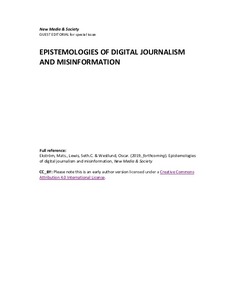EPISTEMOLOGIES OF DIGITAL JOURNALISM AND MISINFORMATION
Abstract
Verified, fact-based information is presumed to be an important feature in society, for
citizens individually and for democratic governance as a whole. During much the 20th century,
legacy news media enjoyed a prominent position in attempting to fulfill that role, reporting on
happenings near and far. Journalists professionalized over time, developing standards, norms,
methods, and networks of sources that enabled them to make knowledge claims (Carlson, 2009).
In recent years, journalists have further developed their knowledge-based practices to fit the
affordances of digital media platforms, such as sourcing on social media (e.g., Lecheler &
Kruikemeier, 2016; Hermida, Lewis, & Zamith, 2014). Journalists’ epistemological activities—
presumed to provide factual and reliable public information—have made journalism one of the
most influential knowledge-producing institutions in society (Ekström & Westlund, 2019a).

